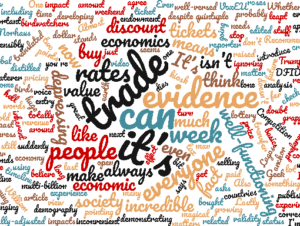Hi all,
So, it is possible to make lemonade after all. With the NBA season fast approaching and my heart rate correspondingly beginning to creep up, Cleveland and Boston pulled off a monster trade that should shine a light in darkness everywhere: even when your luck bottoms out, and a man capable of this tells you he wants out, you can come up smelling like roses. And on that inspirational message, I’ll get on to all the depressing economics of the week.
- There was a lot of cool trade stuff published this week, including this two–parter by William Norhaus. It’s ostensibly about (against) Trump’s view of global trade, but it’s worth reading by all for a clear and wide-ranging exposition of the economic orthodoxy on trade. Whether or not you agree with it, it’s important to understand it. One line leapt out at me: “In a well-functioning society, the status of a fact is decided by evidence and experiment.” I’m not sure whether I can think of a society that meets that test, honestly – not even mini-societies like our own bureaucracy here. Another point to make: of course trade affects the composition of jobs. Trade is a means through which we can specialise more. Specialisation means doing less of some things and more of others. Policy makers and economists need to be straight and open about this. More on how people adjust to that here.
- Speaking of well-functioning societies, lots of people think Scandinavia comes closer than most to fitting the bill, but it’s not quite that simple: this paper finds that among Danish politicians, the provision of more evidence makes decision-making worse, not better, as it simply strengthens the existing prior beliefs they hold. It’s always nice to be presented with evidence suggesting your entire raison d’etre could be a chimera.
- Maya Forstater probably has much experience of people well-versed in ignoring inconvenient evidence. She seems to be the lone voice pointing out that there isn’t some magical tax that is suddenly going to quintuple the revenue raised by developing countries. This week she points out that transfer pricing isn’t the multi-billion dollar prize that many believe it to be.
- This is totally incredible: a video demonstrating the endowment effect. In it, a reporter stands next to the kiosk selling lottery tickets and asks everyone there if she can buy the ticket they just bought – for more than they paid for it. Almost everyone says no, despite the fact that they could turn around and buy more tickets in a matter of seconds. Even if they edited the hell out of this, it’s still incredible.
- Geek out on discount rates: a VoxEU article about the impact of using demographically-adjusted discount rates on rates of time preference. This is something DFID has grappled with a bit in the past, too. Recommended, if only to introduce you to the basics. Also demography related: Lagos cannot stop growing.
- Competition matters (a huge amount of economics could be distilled into those two words).
- Lastly, one for the birdwatchers: an analysis of the economic value of birds. I don’t doubt the validity of any of this, but it’s depressing to me that so much of what should have inherent value now needs to be translated into impacts on the economy. And if that doesn’t depress you, check out this timeline of the far future – you can always anchor whatever you’re doing now against the last entry: earth dies.
Have a great long weekend, everyone!
R

